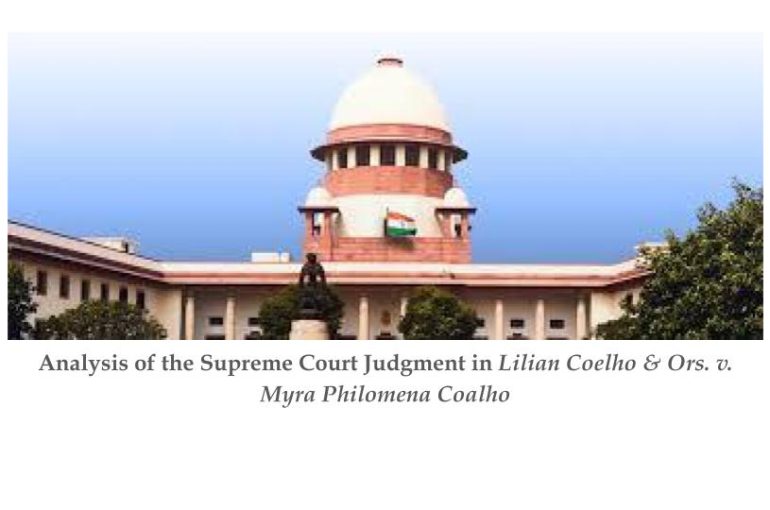Analysis of the Supreme Court Judgment in Lilian Coelho & Ors. v. Myra Philomena Coalho
Introduction
The Supreme Court judgment (Division Bench) in Civil Appeal No. 7198 of 2009 addresses a critical testamentary dispute involving a Will executed by Mrs. Maria Francisca Coelho. The case highlights the interplay between valid execution and the genuineness of a Will, as well as the legal standards for resolving suspicious circumstances surrounding its execution.
Background of the Case
The case originated from a dispute regarding the Will of Mrs. Maria Francisca Coelho, who passed away in 1985. The Respondent, Myra Philomena Coalho, filed a petition for Letters of Administration (LoA) with the Will annexed. The Will, dated July 7, 1982, purportedly distributed the deceased’s property equally among her two sons (George and Reginald) and her daughter (Myra).
However, the Will was contested by Victor, another son of the deceased. He alleged that the Will was not genuine and was surrounded by suspicious circumstances. After Victor’s death, his widow pursued the objections. The petition was subsequently converted into a testamentary suit, raising several legal issues.
Lower Court Proceedings
Single Judge of the Bombay High Court:
The Testamentary Suit was adjudicated by a learned Single Judge, who framed issues based on the pleadings, including:
Whether the Will was executed and attested as per legal requirements.
Whether the deceased was in a sound and disposing state of mind.
Whether the defendants proved forgery, coercion, or undue influence.
The Single Judge found that:
The Will was validly executed as per Section 63 of the Indian Succession Act and Section 68 of the Indian Evidence Act.
The deceased was of sound mind and had testamentary capacity.
Allegations of forgery, coercion, or undue influence were not proved by the defendants.
Despite these findings, the Single Judge concluded that the Will was surrounded by suspicious circumstances. The plaintiff failed to dispel these doubts, and the Court dismissed the suit, denying the grant of LoA.
Division Bench of the Bombay High Court:
On appeal, the Division Bench re-examined the evidence and reversed the Single Judge’s decision.
The Bench held that once a Will’s execution was proven, there was no need to address suspicious circumstances further. It concluded that the Will was genuine and granted LoA to the Plaintiff.
The Bench’s reasoning equated valid execution with genuineness, disregarding the need to scrutinize unresolved suspicious circumstances.
Supreme Court Judgment
The Appellants challenged the Division Bench’s ruling before the Supreme Court. The Supreme Court meticulously analyzed the legal principles and the judgments of both lower courts.
Key Legal Questions:
Whether the Division Bench correctly overturned the findings of the Single Judge.
Whether valid execution of a Will automatically establishes its genuineness.
The role of suspicious circumstances in testamentary disputes.
Supreme Court Observations:
The Court emphasized that proving valid execution of a Will under Section 63 of the Indian Succession Act and Section 68 of the Evidence Act does not suffice to establish its genuineness.
Suspicious circumstances surrounding the execution must be addressed by the propounder, and failure to dispel such doubts can render the Will invalid, even if executed correctly.
The Division Bench erred in disregarding the Single Judge’s findings on suspicious circumstances without conducting a detailed examination.
Remand for Reconsideration:
The Supreme Court set aside the Division Bench’s judgment and remanded the case for fresh consideration.
It directed the High Court to comprehensively analyze both the execution and the suspicious circumstances surrounding the Will, ensuring justice is served.
Legal Principles Reinforced
The judgment highlights key principles governing testamentary disputes:
Execution vs. Genuineness:
A Will must not only be validly executed but also free from suspicious circumstances to be considered genuine.
Courts must evaluate whether the testator acted voluntarily, without coercion, undue influence, or fraud.
Burden of Proof:
The burden lies on the propounder to prove the Will’s genuineness and dispel any doubts raised by the objector.
Judicial Duty:
Courts must carefully examine evidence and resolve all suspicious circumstances before granting Letters of Administration.
Conclusion
The Supreme Court’s judgment reaffirms the importance of balancing procedural correctness with substantive scrutiny in testamentary matters. It emphasizes that valid execution alone does not guarantee the genuineness of a Will and highlights the need to address all suspicious circumstances comprehensively.
Shikha Pandey
Associate
The Indian Lawyer & Allied Services
Editors comments
The Supreme Court’s observation that despite the validity of the will if a will is shrouded in suspicious circumstances the will can be challenged. However it is for the challenging party to prove how the will is doubtful as being genuine. The Supreme Court held that a will cannot be accepted if there are circumstances that prove the will to be doubtful. The Apex Courts final remand for fresh consideration provides an opportunity to the Division Bench to rectify its earlier oversight and ensure that the principles of testamentary law are upheld. This case sets a vital precedent for future disputes, ensuring that courts remain vigilant in safeguarding the testator’s intentions while addressing objections fairly and thoroughly.
Sushila Ram
Advocate & Chief Consultant
The Indian Lawyer & Allied Services
If you want to learn more on the impact of Lease Agreements visit our YouTube channel The Indian Lawyer Legal Tips on the link below –





































Leave a Reply